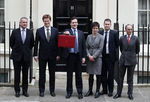2012 Budget Report
26th March 2012
George Osborne, Chancellor of the Exchequer, set the tone for the budget when he said:
"Environmentally sustainable must always be fiscally sustainable."
As well as all the controversy surrounding George Osborne’s so-called ‘Granny Tax’, this budget has also been hailed as a disaster for the environment. David Cameron’s ‘greenest Government ever’ has upset much of the environmental sector with a budget that plans for airport expansion in the south-east, introduces tax breaks for oil and gas and plans for expansion, and doesn’t provide any additional funding for green energy. So, what are the key features of the budget affecting the environment this year?
Renewable energy
Clean energy would be an infrastructure priority on a par with roads and broadband, George Osborne said today. "I also want to see investment in our world-leading energy sector including renewables," he said, adding that "renewable energy will play a crucial part in Britain's energy mix but I will always be alert to the costs we're asking families, business to bear." He recapped the establishment of the green investment bank and plans to introduce a carbon floor price from April 2013. However, no new funds were offered for green energy.
Dash for gas
The Chancellor signalled that the Government would be backing new gas power, saying "gas is cheap" and that it would be the UK's biggest source of electricity generation in coming years. He said the Ed Davey, Secretary of State for Energy and Climate Change, would lay out plans to encourage gas investment in the autumn. The Department of Energy and Climate Change (DECC) has now announced rules that will encourage new gas power.
Carbon Reduction Commitment (CRC) changes
The Chancellor strongly criticised the Carbon Reduction Commitment (CRC) as a £1bn tax on businesses' energy use, which he previously changed from a scheme to reward companies' cutting energy demand to a tax in the 2010 comprehensive spending review. "It is cumbersome, bureaucratic and imposes unnecessary costs on business," he said. He also said he would seeking savings for businesses through administrative costs, and if they could not be found, would look at replacing the CRC with a new environmental tax.
Air passenger duty (APD) rise
A rise in the environmental tax on flights, APD, went ahead as planned, despite a last-minute lobbying push by airlines. Duty will rise 8% this year, eventually rising 50% by 2016.
Planning reforms
Britain will earn its way in the world through "new growth-friendly planning laws," the Chancellor said. The Government will also publish the results of its controversial planning reforms, the national planning policy framework. These would feature a "presumption in favour of sustainable development while protecting our most precious environments," a statement that will infuriate green groups who say such sustainable development is poorly defined and biased towards economic development. George Osborne called it the biggest reduction of business red tape ever undertaken.
Airport expansion
The budget statement seemed to suggest a U-turn on the Government's stance on airport expansion. "We must confront the lack of airport capacity in south-east England – the transport secretary will set out government thinking later this summer," the Chancellor said. However, the 2010 coalition agreement pledged to cancel the third runway at Heathrow and refuse permission for additional strips at Gatwick and Stansted.
Environmentalists reactions
John Sauven, executive director of Greenpeace: "This was a bad day for the environment. Support for British manufacturing, green jobs and greening the economy should have been the cornerstone of Osborne's budget. Instead we got a polluters' charter. The chancellor performed a carbon-belching U-turn by supporting airport expansion in the south-east, before handing tax breaks to an oil industry that's already making billions in profits and a cash bung to the very same oil industry to drill in our fragile seas."
Friends of the Earth's executive director, Andy Atkins: "This budget sticks two fingers up at David Cameron's promise to build a clean future – and gives a massive thumbs down to new jobs and cutting our reliance on expensive gas and oil. Safeguarding our environment and growing a strong economy go hand-in-hand – but the chancellor has fired the starting pistol for more roads, airports and gas power that will keep the UK hooked on costly fossil fuels for decades to come."
Martin Harper, RSPB Conservation Director: “While the Chancellor waves the flag for carbon reduction initiatives and green investment with one hand, he is pushing through tax incentives for oil and gas drilling off the coast of Scotland with the other. His plan for growth clearly involves building more infrastructure, more roads and more runways, but this must be compatible with the green economy we have been promised so many times by this Government.”
To read more analysis on the 2012 Budget, visit the
Guardian website.
To read the Budget documents in full, visit the
HM Treasury website.






 Except where otherwise stated, content on this site is
licensed under a Creative Commons Attribution 3.0 License.
Except where otherwise stated, content on this site is
licensed under a Creative Commons Attribution 3.0 License.
